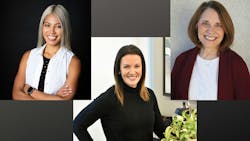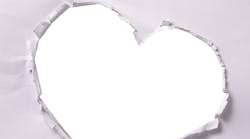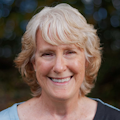The 2024 Heart to Hands Award presented by Philips and RDH magazine
As my patient and I waited for the dentist to come into the room to do his exam, our conversation somehow turned to artificial intelligence (AI), a topic that ‘s been in the news quite a bit lately. There is much to be said on the pros and cons of AI performing tasks that were once done solely by human beings. However, our conversation was cut short by the arrival of the dentist. As the patient was leaving, she said, “I’ll see you in six months.” I jokingly replied, “Yup, as long as I haven’t been replaced by a robot.” She said, “That will never happen. Nobody would want that.”
I thought about her words as I cleaned my operatory. If someday a robot could be programmed to do everything a hygienist can do, and maybe do it even better, why wouldn’t a person want that?
I think the answer is obvious. A robot can be built with mechanical hands, but can never be built with a human heart. Patients do not see us as robotic tooth cleaners (I hope!). They form relationships with us, sometimes close relationships. They learn to trust us and they make us promise never to retire. While some patients may be perfectly content to sit in our chair, open their mouth, close their eyes, and “get it over with” as quickly and silently as possible, I find that most people appreciate a little friendly chitchat, and some patients seem to hunger for the human connection far more than the clinical and educational services we provide.
Skillful hands are always appreciated by patients, but caring hearts are equally, if not more, appreciated. Today, we celebrate three hygienists who have made a positive difference in their patients’ lives. The 2024 winners of the Philips/RDH Heart to Hands Award are Ann Dohm, Kristine Gatdula, and Amanda Zubricki. It’s an honor to celebrate the stories of these three dental hygienists who have contributed so passionately to making a positive difference in others’ lives.
Ann Dohm, RDH: Changing (and saving) lives
When we say that dental hygienists save lives, we’re usually thinking about oral cancer screenings and educating patients on the oral-systemic connection. Not many of us think of living organ donation. But that’s exactly what Ann Dohm did, literally saving her patient’s life.
Dental hygienists interact on a personal level with patients every day. We don’t always know how our words or actions may change someone’s life. But sometimes we do find out that we’ve had a profound effect on someone. Ann tells the story of how she attended a dental hygiene conference and sat with a hygienist who was a friend of her younger sister. The hygienist told Ann that she had become a hygienist after hearing Ann give a dental talk in grade school. Ann never knew that her words were the inspiration for that woman’s decision to become a hygienist.
While we will never know completely the impact we have on our patients or the people around us, there are times when we do see the results of our words and actions. Sometimes it’s as simple as seeing a patient return to our chair with a clean and healthy mouth after taking our advice six months earlier.
At other times, we may be privileged to see the life-altering impacts that our decisions bring about. Such was the case with Tim, a patient who came to see Ann seven years ago. Here is his story, in his own words:
“I can do that.” At least that’s what I thought I heard her say as she escorted me to the reception desk to schedule my next appointment. I paused for a moment, looked at Ann, and asked, “Sorry, Ann, what was that?” She repeated her words: “I can do that. What do I need to do?” That was the beginning of the conversation that would forever change my life.
You see, my kidney function had recently dropped to a new low, a level that allowed me to join the more than 90,000 other Americans already on the national transplant list. While meeting with several professionals to ascertain my eligibility into the transplant program, my pretransplant coordinator handed me a card and said, “If you have friends or family members interested in donating a kidney, give them this card. The website will explain everything they need to know.”
I had given that card to Ann, and true to her spirit, she took over from there. Ann spent the next several weeks completing forms and subjecting herself to medical testing. Then she called one day and said, “Can my husband and I stop over for a few minutes? I have some news for you.” When they arrived, Ann reached into her purse and pulled out a can of kidney beans. With a big smile, she simply said, “These will have to do until you need mine. I’m a match!”
Throughout the entire donor matching process, Ann did not waver in her selfless mission to save a life—my life. Not once did she have second thoughts about the sacrifice she was about to make to help someone in need. Ann represents the epitome of the prestigious Heart to Hands award and is a perfect example of someone who loves their profession and is willing to make this world a better place.
Yes, “I can do that” was indeed what she said and exactly what she did on a cold January morning in 2018. I remain eternally grateful and forever a friend.
Ann says, “I’m honored that I was able to do this. To help Tim. To tell our story. To tell people about organ donation. I’m blessed that I had a family, coworkers, and friends who helped me and supported me when I donated my kidney. And I picked the best career, dental hygiene.
“There are over 100,000 people on the national transplant waiting list. Every eight minutes someone is added to that list. Seventeen people die every day waiting for an organ transplant. Some scary statistics. I knew none of these numbers until after I donated. That’s why I tell our story.”
When she’s not working, Ann enjoys spending time with her husband, three adult children and their spouses, and three grandchildren. She loves traveling to Europe, walking her dog, reading, and kayaking.
Kristine Gatdula, BS, RDH, OMT: Making dreams come true
Kristine Gatdula’s mom became a dental assistant when she emigrated from the Philippines to the United States. Her mom emphasized the importance of oral health and brought Kristine to her office regularly. As a child, Kristine enjoyed the friendliness of the staff and the wonderful post-dental hygiene feeling of clean teeth. She knew early on that she too wanted to be in a profession where she could care for people.
Upon graduating from hygiene school, the positive environment that she had envisioned did not mesh with reality. She burned out quickly. The high-level education she had received and the quality of patient care she had provided in school were not supported in many dental practices. The stress of not being able to care for her patients the way they deserved led Kristine to pursue a different line of work, and she became a yoga instructor. Teaching yoga enabled Kristine to fulfill her dream of helping people feel better.
After moving to Colorado, Kristine began working in a private practice. She also worked in various public health programs with her local regional oral health specialist on her days off. She sought out direct access dental hygienists to learn more about how they practiced, and she went back to school and graduated with a Bachelor of Science in Dental Public Health in 2019.
Early in Kristine’s career, her mind started to shift on what preventive care could look like. She says, “I was working at a school-based health center (SBHC) where I provided preventive dental care with an integrated care team alongside behavioral health and medical providers. Speaking to other nondental health-care providers at the health center was empowering. I realized that we are uniquely positioned preventive health-care providers with a skill set that is integral to any health-care team. I had many encounters that inspired my new approach to dental hygiene and whole-person care.”
The formative experiences at the SBHC inspired Kristine’s dream of seeing dental hygienists in other care settings. She presented her idea to integrate dental hygiene into the care model of an innovative, like-minded, private integrated medical/behavioral health practice, “and now I see endless opportunities.”
Kristine says, “I have always had a desire to have my own business and create a work culture that matched my work ethic and philosophy, which is to treat my patients the way I would want to be treated and cared for. My dreams are big and I want to inspire my peers to dream big as well, because I was once the hygienist who found frustration, monotony, and stagnation in my career.”
Kristine’s dreams of owning her own business in collaboration with other health-care providers have come true with the establishment of her dental hygiene practice, Floss Aspen Dental Hygiene, and her myofunctional therapy practice, Aspen Myofunctional Therapy.
Her dental hygiene practice is located in an integrated medical practice that comprises physicians, nurse practitioners, physician assistants, nurses, a behavioral health team including an addiction counselor, a community food bank, a recovery space, and a nonprofit, all committed to making their community the healthiest community in Colorado. Kristine’s hybrid in-person/online myofunctional therapy practice is connected with other providers such as physical therapists, ENTs, chiropractors, massage therapists, behavioral health providers, and other medical providers.
Kristine says, “I believe in setting an example in all things because we never know who may be affected by our actions, from a simple smile to practicing compassion for an anxious dental patient. Being integrated in the schools helped me recognize that although the oral cavity is our specialty, sometimes it is not the most important problem to tackle in that moment, but rather the rest of the person attached to this mouth.”
Kristine wants to inspire other hygienists and let them know that there are many opportunities available to them. She says, “If we empower hygienists, we have more providers to create change.”
In her spare time, Kristine enjoys anything that allows her to connect with nature and the outdoors, including snowboarding, skiing, mountain biking, dirt biking, kayaking, surfing, and golf. She is also a student and teacher of yoga. She attributes her longevity in her career to practicing yoga from the start.
Amanda Zubricki, BS, RDH, OMT: A voice for the deaf and hard-of-hearing
Amanda Zubricki was born profoundly deaf into a hearing family. Growing up, she was exposed to both deaf and mainstream cultures. She became a professional dancer, but after graduating with a bachelor’s degree in psychology in 2009, she wasn’t sure what direction to take. The only thing she was certain of was that she wanted to do something meaningful, “to make a difference.” She pursued massage therapy for a few years and traveled. But she still didn’t feel completely fulfilled.
For reasons still not completely understood by Amanda, she decided to apply to a dental hygiene program. She says, “I don’t honestly know why, but it felt right to me at the time. It took several tries, and a couple of years later, I got into the program and found myself thinking what have I done? I nearly flunked my first semester but redeemed myself after that. Five semesters and many puddles of tears later, I graduated and got my license in 2017.”
The first few years in the profession were filled with adversity, and Amanda realized that there was a need for deaf awareness in the dental field. In response to that need, Amanda started a nonprofit, “That Deaf RDH,” which supports deaf or hard-of-hearing dental hygiene students to help them pursue their career goals. She says, “The whole thing ended up being a beautiful mistake that led me to do what I do today. I get to inspire and encourage deaf or hard-of-hearing students to become dental hygienists. I get to share my platform by speaking and raising awareness of the deaf community. I can empower both myself and others in once unimaginable ways.”
Amanda wears hearing aids in both ears and learned American Sign Language (ASL) but uses speech as her primary means of communication. She has traveled around the country speaking about deaf and hard-of-hearing disparities in dentistry. She takes pride in advocating for others with hearing loss.
Through her social media platforms Amanda hopes to raise awareness and educate others in both the general and deaf/hard-of-hearing cultures. She states, “There’s a need for ableism to stop, not just with hearing loss but with other disabilities. It’s not easy putting yourself out there with a personal disability, because it’s such a vulnerable position, but I want others to know the possibilities are endless, and there’s no reason to be put in a box because of disabilities.”
Amanda achieved one of her goals last year, when she had the opportunity to speak at RDH Under One Roof. She says, “Public speaking has always been a fear of mine due to negative feedback regarding my speech and disability. However, since I began speaking in 2020, I have grown significantly and faced the challenges that come along with it. It’s so crucial to spread awareness and bring the community together to create an inclusive setting. It has been a humbling experience that I will always be grateful for.”
Amanda currently works chairside four days a week in a general practice. With three girls under the age of four, two of them twins and one with hearing loss, Amanda doesn’t have a lot of free time, but when she does, she enjoys lifting and a foodie night out with her “amazing, supportive husband” whenever they get a chance.
Earlier this year, Amanda opened her myofunctional therapy practice and has integrated it into her dental office part-time. She says, “It’s been amazing so far and I’m so excited to see where it takes me.”
Amanda tries not to worry about the future too much. She prefers to “stay as present as possible.” Her career goals include continuing to spread awareness in order to provide better accessibility for deaf or hard-of-hearing individuals in school and clinical settings, both for students as well as patients. She says, “Deaf or hard-of-hearing patients need us to be inclusive so they can have access to the care they need.”
Congratulations, Ann, Kristine, and Amanda!
I think my patient was right. Nobody would want their hygienist replaced by a robot. A robot can’t know when to switch from focusing on the mouth to focusing on the emotional state of a patient. A robot can’t be an advocate for the deaf and hard of hearing. And a robot certainly can’t donate a kidney. The healing hands and the caring heart of a hygienist are irreplaceable. I’m sure the patients of Ann Dohm, Kristine Gatdula, and Amanda Zubricki would agree.
Editor's note: This article appeared in the April/May 2024 print edition of RDH magazine. Dental hygienists in North America are eligible for a complimentary print subscription. Sign up here.
Kirsten Brancheau, BA, RDH, has been practicing clinical dental hygiene since 1978. She earned an associate’s degree in applied science in dental hygiene from Union County College in 1977 and a bachelor of arts degree in English literature from Montclair State University in 1988. She is a member of the American Dental Hygienists’ Association. Brancheau is also a freelance proofreader, editor, and writer. She can be reached at [email protected].
About the Author
Kirsten Brancheau, BA, RDH
Kirsten Brancheau, BA, RDH, practiced clinical dental hygiene from 1978 until her retirement in 2025. She continues to work occasionally as a temp. Kirsten earned an associate’s degree in applied science in dental hygiene from Union County College and a bachelor of arts degree in English literature from Montclair State University. She is a member of the American Dental Hygienists’ Association. Kirsten is also a freelance proofreader, editor, and writer. She can be reached at [email protected].



